| Srl | Item |
| 1 |
ID:
102272
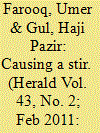

|
|
|
| 2 |
ID:
099492
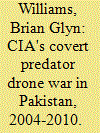

|
|
|
|
|
| Publication |
2010.
|
| Summary/Abstract |
This article provides the first overview of the CIA's secret drone campaign against Al Qaeda and the Taliban in Pakistan's tribal areas from its origins in 2001's Operation Enduring Freedom to the end of 2010. In the process it addresses the spatial dimensions of the campaign (where are the strikes being directed and where do the drones fly from), Pakistani reactions to this threat to both their sovereignty and an internal Taliban enemy, technological developments and Taliban and Al Qaeda responses to this unprecedented airborne assassination campaign. While the debate on this issue has often been driven by the extremes which either support the campaign as the most effective tool in killing terrorists or condemn it for driving Pakistanis to new levels of anti-Americanism, this article points out a third path. Namely, that many Pakistani Pashtun tribesmen living in the targeted areas support the strikes against the Taliban who have terrorized them in recent years.
|
|
|
|
|
|
|
|
|
|
|
|
|
|
|
|
| 3 |
ID:
093078
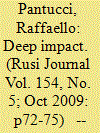

|
|
|
|
|
| Publication |
2009.
|
| Summary/Abstract |
The use of drones against targets along the Pakistani border has been a controversial tactic in the prolonged war in Afghanistan, though one that looks set to be a key part of Obama's future strategy. But drone strikes are part of a complex chain of events, providing fuel for the jihad fire; for the UK in particular, the strikes have a significant domestic impact upon its large Pakistani minority that should not be ignored.
|
|
|
|
|
|
|
|
|
|
|
|
|
|
|
|
| 4 |
ID:
108338
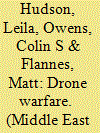

|
|
|
| 5 |
ID:
103761


|
|
|
| 6 |
ID:
122760
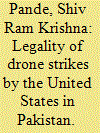

|
|
|
| 7 |
ID:
103287
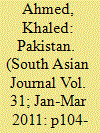

|
|
|
| 8 |
ID:
130957


|
|
|
|
|
| Publication |
2014.
|
| Summary/Abstract |
America's Employment of Weaponized Unmanned Aerial Vehicles (Uavs), Popularly Known as "drones," to kill alleged terrorists in Pakistan's federally administered tribal areas (FATA) fuels sustained controversy in Pakistan. Pakistani outrage has steadily deepened since 2008, when the United States increased the frequency of the strikes.1 The increasing use of "signature strikes" has been particularly controversial in (and beyond) Pakistan, because such strikes are targeted at "men believed to be militants associated with terrorist groups, but whose identities aren't always known."2 Whereas personality strikes require the operator to develop a high level of certainty about the target's identity and location, based on multiple sources such as "imagery, cell phone intercepts and informants on the ground,"3 operators may "initiate a signature strike after observing certain patterns of behavior."4 When conducting signature strikes, the United States assesses that the individuals in question exhibit behaviors that match a pre-identified "signature" (for example, pattern of observable activities and/or personal networks) that suggests that they are associated with al Qaeda and/or the Pakistani or Afghan Taliban organizations.5 Because the identity of the target is unknown, even during the strike, it is possible that these persons are innocent civilians, a possibility that both current and former U.S. government officials concede.6 While the George W. Bush administration employed both personality strikes from 2004 and signature strikes from 2008 in Pakistan, the administration of Barack Obama has redoubled the use of both types.7 This has ignited public protests against the drones in Pakistan, particularly in Pakistan's urban areas-far removed from the tribal areas where drones are employed. It has also galvanized a vigorous debate within Pakistan's National Assembly, which tried, but ultimately failed, to curtail the strikes
|
|
|
|
|
|
|
|
|
|
|
|
|
|
|
|
| 9 |
ID:
104860


|
|
|
| 10 |
ID:
120801
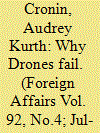

|
|
|
|
|
| Publication |
2013.
|
| Summary/Abstract |
Drones are not helping to defeat al Qaeda and may be creating sworn enemies out of a sea of local insurgents. Embracing them as the centerpiece of U.S. counterterrorism would be a mistake.
|
|
|
|
|
|
|
|
|
|
|
|
|
|
|
|